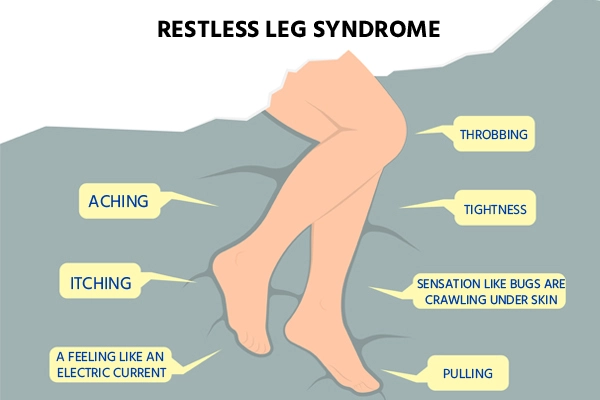Restless legs syndrome (RLS)
Restless legs syndrome (RLS) is a condition that causes uncontrollable movement in the legs, due to unpleasant sensations. It happens when a person is sitting or lying, it usually occurs during the evening or late at night. Moving around temporarily alleviates the uncomfortable sensation
Restless legs syndrome, also known as Willis-Ekbom sickness, can strike at any age and worsens with time. It can interfere with daily tasks by disrupting sleep.

Symptoms
The primary symptom is a strong desire to move one's legs. RLS is often accompanied by the following symptoms:
- Sensations in legs while sleeping- The sensation usually starts after lying or sitting for a long period of time, such as in a car, plane, or movie theatre.
- With movement, there is a relief- With movement, such as stretching, jiggling the legs, pacing, or walking, the sensation of RLS decreases.
- Worsening symptoms in the evening- Symptoms are most noticeable at night.
- Leg twitching in the middle of the night- RLS may be linked to a more frequent condition known as periodic limb movement of sleep, which causes your legs to twitch and kick while you sleep.
RLS symptoms are commonly described as strong, uncomfortable feelings in the legs or feet. They most commonly occur on both sides of the body. The arms are less usually affected by the sensations.
The feelings, which are felt inside the limb rather than on the skin, are described as follows:
- Crawling
- Creeping
- Pulling
- Throbbing
- Aching
- Itching
- Electric sensation
It's normal for symptoms to change in intensity. Symptoms may disappear for a period of time before reappearing.
Causes
RLS may be caused by an imbalance of the brain chemical dopamine, which transmits impulses to control muscular activity. Following factors contribute to its onset.
- Hereditary Reasons : Restless Legs Syndrome can run in families, especially if it develops before the age of 40. Researchers have discovered possible RLS gene locations on the chromosomes.
- Pregnancy : RLS symptoms and indications may be temporarily worsened by pregnancy or hormonal changes. RLS strikes some women for the first time during pregnancy, especially in the third trimester. Symptoms, on the other hand, frequently go away following birth.
Risk Factors
Restless Legs Syndrome is usually not caused by a major underlying medical condition. However, it is occasionally associated with other conditions, such as:
- Peripheral neuropathy : Damage to the nerves in the hands and feet caused by chronic disorders such as diabetes and alcoholism.
- Iron deficit : Even in the absence of anemia, iron deficiency can induce or worsen RLS. If you have a history of stomach or intestinal bleeding, have heavy menstrual cycles, or donate blood frequently, you may be iron deficient.
- Kidney failure : If you have kidney failure, you may also have iron shortage, which is commonly accompanied by anemia. When the kidneys do not operate properly, iron levels in the blood might fall. This, as well as other changes in body chemistry, may induce or worsen RLS.
- Spinal cord disorders : RLS has been connected to spinal cord lesions caused by damage or injury. Having had spinal cord anesthesia, such as a spinal block, increases the likelihood of developing RLS.
- Parkinson's illness : People who have Parkinson's disease and take specific drugs known as dopaminergic agonists are more likely to develop RLS.
Diagnosis
- You have a strong, often implacable desire to move your legs, which is generally accompanied by unpleasant sensations.
- When you're resting, such as sitting or lying down, your symptoms begin or worsen.
- You have a strong, often implacable desire to move your legs, which is generally accompanied by unpleasant sensations.
- Physical exercise, such as walking or stretching, relieves your symptoms partially or briefly.
- At night, your symptoms become more severe.
- Symptoms aren't exclusively due to another medical or behavioural problem.
A physical examination and a neurological examination may be performed by your healthcare practitioner. Blood tests, especially for iron deficiency, may be conducted to rule out other reasons for your symptoms.
Your healthcare practitioner may also refer you to a sleep specialist. If another sleep issue, such as sleep apnea, is suspected, an overnight stay and a study at a sleep clinic may be required. A sleep study is usually not required for the diagnosis of RLS.
Treatment
RLS symptoms can be considerably relieved by treating an underlying problem, such as iron insufficiency. Iron supplements can be taken orally or intravenously to treat an iron deficit. Take iron supplements only under medical supervision and after your blood iron level has been verified by your provider.
If you have RLS without a coexisting disease, your treatment will be focused on changing your lifestyle. If things don't work, your doctor may prescribe medicines.
There are several prescription medicines available to relieve leg restlessness, the majority of which were created to treat different disorders such as
- Medications that increase dopamine in the brain
- Drugs affecting calcium channels
- Muscle relaxants and sleep medications
- Opioids
